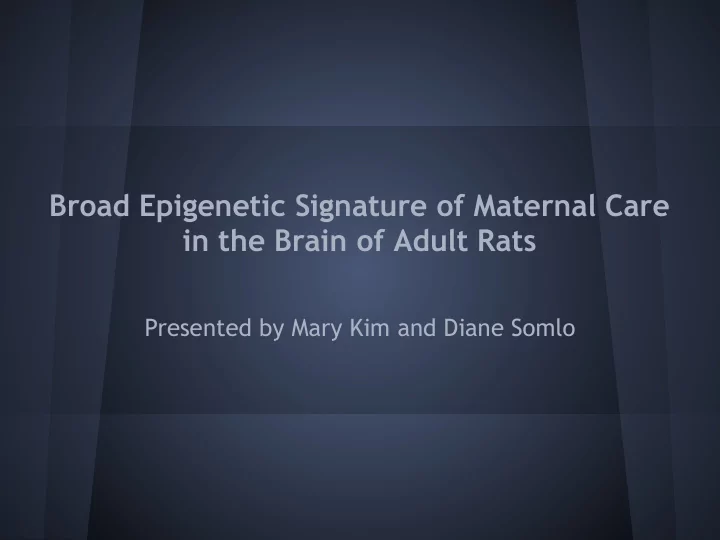

Broad Epigenetic Signature of Maternal Care in the Brain of Adult Rats Presented by Mary Kim and Diane Somlo
Authors and Contributors Patrick O. McGowan Matthew Suderman ● Bioinformatician at McGill University, Montreal, Canada ● Professor in the Department of Biological Sciences at University of Toronto at Scarborough
Authors and Contributors Aya Sasaki Tony C. T. Huang ● Graduate student at McGill ● Research assistant at McGill University University
Authors and Contributors Michael T. Hallet Michael J. Meaney ● Director of McGill Center for ● Professor of Psychiatry, Neurology, Bioinformatics and Neurosurgery at McGill ● Training Program in Systems Biology University ● Breast Cancer Informatics and ● Research focus: effects of Goodman Cancer Center maternal care on expression of ● Associate Professor genes related to regulation of stress
Authors and Contributors Moshe Szyf ● Professor of Pharmacology and Therapeutics at McGill University ● Szyf Lab: epigenetics research, epigenetics and cancer
About the Journal Public Library of Science ● "Open for Discovery" ○ Non-profit, open access scientific publishing project PLoS One ○ Impact Factor (2011): 4.092
Epigenetics ● Literal translation is“above the genome.” ● Epigenetic changes are changes in gene function that do not involve modification of the actual genome. ● The main components of the epigenetic code include DNA methylation, histone modification, and non-coding RNAs. ● Some epigenetics changes are reproduced and kept through mitosis and meiosis.
DNA methylation ● Covalent bond between a methyl group and the 5’ cytosine ring
Histone Acetylation
Epigenetic Effect of Early Care on Stress Response: Basics of Response Hypothalamus-Pituitary-Adreno (HPA) Axis Glucocorticoid Receptors ● Binds cortisol, etc. ● Important to shut down stress response
Epigenetic Effect of Early Care on Stress Response: Study "Epigenetic regulation of glucocorticoid receptor in the human brain associates with childhood abuse" Nature Neuroscience 12 , 342 - 348 (2009) ● Hypothesis : childhood abuse impairs HPA stress response and increases risk of suicide by epigenetically altering expression of neuron-specific glucocorticoid receptor (NR3C1) ● Findings : Abuse/Suicide victims had lower NR3C1 expression and increased promoter methylation
Goal of Study ● Goal: To observe whether epigenetic regulation of gene expression as a function of maternal care occurs widely throughout the genome. ○ Do epigenetic effects occur in region surrounding gene of interest (NRC31)? Hypothesis: Epigenetic alterations - methylation, acetylation, and altered gene expression - that occur as a function of maternal care are extensive .
Outline of Experiment 1) Vary amount of maternal care in subjects Rats raised under one of two conditions: High licking/grooming (LG) or Low LG care mothers 2) Quantify and observe epigenetic alterations ROI: 7 million bp region flanking NRC31 gene, chromosome 18 a. mRNA expression (Tiling Microarray) b. Methylation and acetylation
Methods ● Long-Evans hooded rats ● Thirty two mothers were observed for 6 x 72 min observation periods (4 periods during the light phase & 2 during the dark phase) for first 6 days postpardum ● Behaviors were scored every 3 min ● Target behaviors include: ○ mother licking/grooming any pup ○ mother nursing pups in an arched-pack posture ○ a "blanket" posture ○ passive posture
Quantification of mRNA concentration: Tiling Microarray ● Contiguous region - location rather than function
Quantifying Methylation and Acetylation: ChIP
Validation of Microarray Results
Validation of Microarray Results
Observed Patterns of Epigenetic Alterations
Regional variations in differences in DNA methylation bw high and low LG adult offspring
Regional variations in differences in histone acetylation, DNA methylation, and gene expression bw high and low LG adult offspring ● High exonic H3K9 acetylation and DNA methylation in high LG adult offspring compared to low LG offspring ● Higher RNA expression among High LG offspring compared to low LG offspring
Epigenomic neighborhood of the first exons in protocadherin gene
Conclusions 1) "Epigenetic response to maternal care is coordinated in clusters across broad genomic areas." 2) Methylation and acetylation due to maternal care are highly specific, suggesting that the epigenetic response is not random.
Discussion ● Protocadherin gene families (synaptogenesis) were significantly altered ● Epigenetic alterations of protocadherins - effect on hippocampal development?
Limitations and Recommendations for Future Study Limitations 1. The mechanisms for these epigenetic changes in response to varying maternal care are unknown. 2. The phenotypic differences between high and low LG offspring were not studied. Recommendations 1. Examine the consequences of epigenetic modifications on NR3C1 expression.
Recommend
More recommend